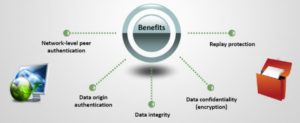 An Introduction to IPSec Protocol :-
An Introduction to IPSec Protocol :-
What is IPsec ?
A set of security protocols and algorithms used to secure IP data at the network layer. IPSec provides data confidentiality ( encryption) , integrity ( hash ) , authentication ( Signature / certificates) of IP packets while maintaining the ability to route them through existing IP networks. It is deployed widely to implement Virtual Private Networks ( VPNs).
Authentication :- Strong authentication services prevent the acceptance of data through the use of falsely claimed identities.
Confidentiality :- Confidentiality services prevent unauthorized access to sensitive data as it passes between communicating parties.
Data origin authentication and integrity :- Data origin authentication and integrity is provided by a hashed message authentication code (HMAC) value, which is included in every packet.
Encryption Layers :-

IPSec protocols :-
IPSec uses two different security services for authentication and confidentiality.
Encapsulation Security Payload :-
Encapsulates the data to be protected; does not provide protection to “outer” headers
 ESP uses IP protocol number 50
ESP uses IP protocol number 50

Authentication Header :-

Header is imbedded in the data to be protected; provides protection to full datagram

Components of IPSec :-
Modes of IPSec :-
Transport Mode :-
- Authenticates two connected computers
- Has an option to encrypt data transfer
- Compatible with NAT
Tunnel Mode :-
- Encapsulates packets being transferred
- Has an option to encrypt data transfer
- Not compatible with NAT
Also Check :- IPSec operation detailed
Hope you like my post. An Introduction to IPSec Protocol. Please Share with others.





